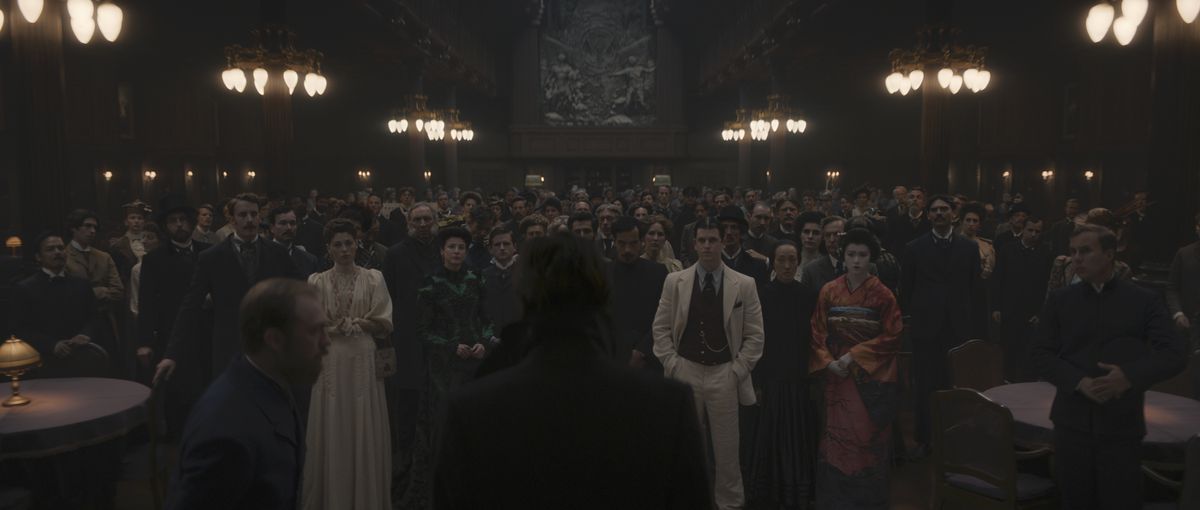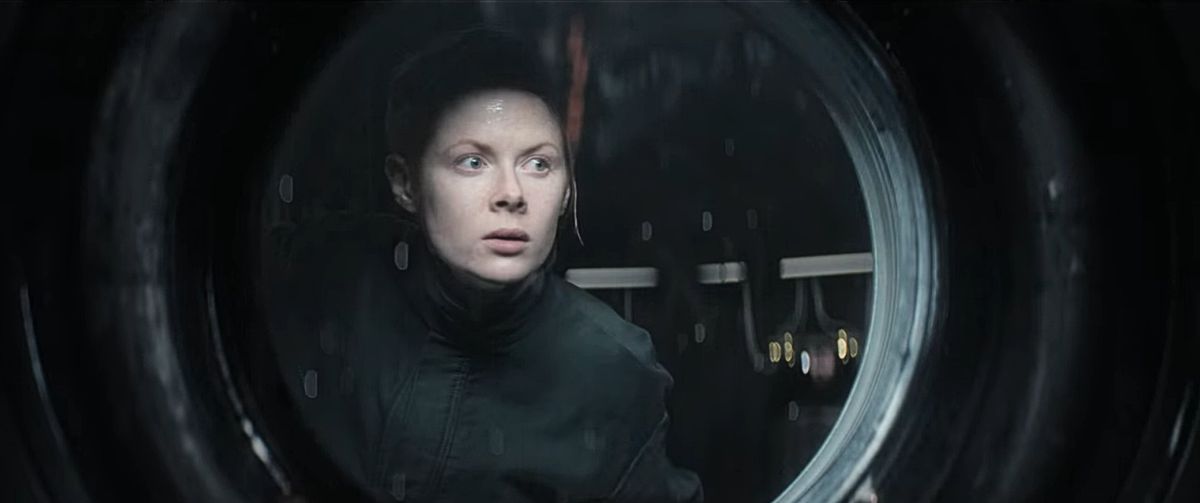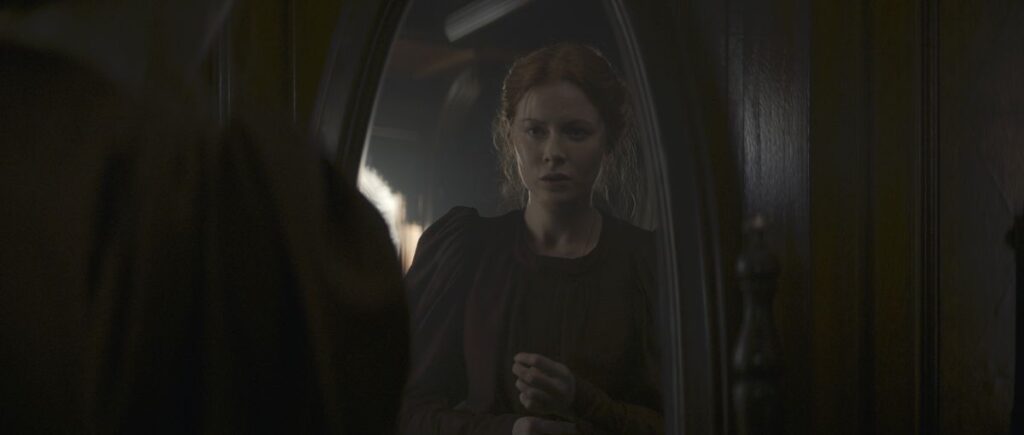[Ed. note: The following contains spoilers for the entirety of 1899 season 1 and Dark.]
I love Dark, the German sci-fi show that nearly broke my brain as I worked overtime (literally) keeping track of its multiple timelines and complicated family tree. While many puzzle-box series lose their luster once everything’s been uncovered, after repeated viewings of the series, my appreciation for Dark never waned. Understandably, my hopes were high for 1899, the follow-up from Dark creators Jantje Friese and Baran bo Odar. It looked exactly like the type of fun, spooky series that would tickle the tinfoil hat part of my brain that loves to fall into rabbit holes parsing out theories, allegories, and hidden connections.
From the very start, 1899 struggled to warrant the same intellectual and emotional investment as its predecessor. Much like Dark, 1899 is set in a self-contained environment — this time, on the steamship Kerberos traveling from Europe to New York City at the turn of the century. The voyage begins four months after another of the company’s ships, the Prometheus, disappeared with over a thousand passengers on board. The daughter of the company’s owner, British neurologist Maura Franklin (Emily Beecham), boards the Kerberos determined to uncover her father’s connection to the Prometheus’ disappearance after receiving a cryptic letter believed to have been sent by her brother, who was a passenger on the missing ship.
Image: Netflix
Though 1899 is Maura’s story, one of the most intriguing elements going into 1899 was its international ensemble of supporting characters. In addition to Maura, several others aboard the Kerberos received their own letters prior to setting sail, including the grieving German ship captain, a pair of disgruntled French newlyweds, a Spanish and Portuguese couple masquerading as brothers, and a Danish family whose matriarch is convinced she hears the voice of God. Though they have nothing in common at first glance, these strangers are bound together by their hope that a fresh start is what they need to forget the pains and sins of their past — and the fact that none of them are on the Kerberos by chance.
Whereas Dark used its small-town setting to weave a complex web of connections between characters that traversed four realities and several timelines, 1899 doles out information about these characters at a glacial pace, making it difficult to see how any individual’s storyline intersects or affects the others. The diverse range of languages spoken — which ideally would have been the backbone of a layered narrative with globally rich, interwoven perspectives — quickly curdles into an insurmountable obstacle that guts any potential the series had for developing an emotional core once characters were finally drawn together.
Several scenes feature passengers pouring their hearts out to one another, confessing truths they’ve been too scared to ever put words to before. The security in making these confessions comes from the speaker’s knowledge that their audience can’t understand nor can they respond to these raw unburdenings, extinguishing any intimacy that would typically come from these exchanges. There are ways to communicate and build deep connections across languages, and 1899 tries to convince us that’s what’s happening — such as with the romance between the Polish stoker and the Chinese passenger — but there’s a colossal difference between telling viewers a meaningful relationship is forming and making them believe it.

Image: Netflix
In Dark, the citizens of Winden were so intertwined it could take hours and several rewatches to fully understand the matrix of relationships. In 1899, one could spend hours looking for these connections and still come up empty. With such thin character development, there’s nothing left but 1899’s plot to carry the full weight of the audience’s interests and expectations — a dangerous situation for any mystery series to be in, and a trap 1899 wastes no time before falling into.
The best puzzle-box shows are the ones that initially mask the full scope of the mysteries at hand, letting audiences get a firm grounding in the world and grow attached to the characters. More importantly, this deliberate pacing allows viewers to become comfortable with their perceived limitations of what the story is telling before the true narrative is revealed. Dark did this masterfully, selling the show to viewers as a time-travel mystery about a missing boy but ultimately delivering a philosophical thriller about a multiverse-ending apocalypse. But rather than take time to establish these preliminary expectations in order to heighten their eventual subversions, 1899 throws subversions right into the thick of things, unveiling twists at such a rapid pace that we learn about beetles that unlock doors and secret passages that lead to nightmarish memoryscapes before learning some of the lead characters’ names. By the time the fifth episode comes around, the (already quite obvious) truth of what’s happening on the Kerberos is confirmed: The passengers aren’t on a ship at all, but rather a simulation of one.
These types of world-flipping twists are precisely what I expected and anticipated from a show by Friese and bo Odar, as they were something they excelled at in Dark. With every passing season, that drama rewrote the rules once again — first introducing a third timeline in the apocalyptic future, then revealing the existence of alternate realities in season 2, and finally unveiling that its protagonist Jonas grows up to be the antagonist Adam. With each twist, we learned something new about the people of Winden: how far they’d go to protect themselves and their loved ones, how they coped with loss, and how these values evolved over time. Every one of these emotional beats became the building blocks in the show’s jumbling tower of twists, which reached its apex when a wormhole poised to erase multiple worlds and caused by the love of a father for his family was prevented by the love of two teens for theirs. Even at the show’s most convoluted, esoteric, or scientific, Dark never forgot that it was a story about interconnected, dysfunctional (and in some branches, incestuous) families.
1899 says it’s about a lot of things — and by this, I mean they literally say what the themes are in comically plain speak in the seventh episode, as characters hammer on about Plato’s cave and debate the knowability of reality like they just left a Midtown showing of Inception. Once the writers thoroughly prep audiences on where the show is going, they pull the final rabbit out of the hat. In the season finale, 1899 reveals that it’s not Maura’s father pulling the strings, but that she’s the one who created the construct — a fact that’d been wiped from her memory, along with everything else about her past before boarding the Kerberos.
Maura struggles to accept the truth, particularly since it comes on the heels of the revelation that the mysterious stowaway Daniel is her husband and the creepy boy found on the Prometheus is her son. But any questions of how this knowledge will impact Maura moving forward turn out to be moot. In fact, everything we’ve seen all the characters go through — their traumatic pasts, their recent tribulations, and an unlucky few’s deaths — turn out to be irrelevant once the season’s final minutes reveal that they’re all actually passengers on another ship — a spaceship.
In a hilariously rote scene set, of course, to David Bowie’s “Starman,” Maura wakes up from the simulation and finds herself on a spaceship in 2099 surrounded by her fellow Kerberos passengers, all of whom remain plugged into the construct. A wide-eyed Maura walks over to a computer screen and is greeted by the message: “Welcome to reality.”

Image: Netflix
Because I was such a fan of Dark, I gave 1899 a patience and grace I wouldn’t typically afford other shows. I tried really, really hard throughout the season to maintain faith that the creators would find a way to tie the story’s disparate threads together in one final twist that would raise the stakes of everything that came before. Instead, the twist only exposed that there were never really any stakes at all.
I have my ideas about what the ship reveal might mean for season 2, but I can’t bring myself to spend enough time thinking about them to mold these thoughts into theories. When the past doesn’t matter, it’s hard to believe the future will.

